[ad_1]
Tens of millions of younger Individuals will face the top of the scholar mortgage fee moratorium this summer time. Why is that this taking place now, after a three-year break from funds? It’s the results of the latest passage of the “Fiscal Duty Act” to lift the debt ceiling. Below that act, the Biden Administration is prohibited from extending the pause on pupil mortgage repayments which have remained in place since March 2020.
“Scholar mortgage funds are set to renew within the coming months. For greater than 40 million Individuals carrying pupil mortgage debt, the timeline to renew making funds is now on the horizon. The debt ceiling deal handed earlier this month paves the best way for pupil mortgage funds to renew as early as August 29, 2023, per the newest replace from the U.S. Division f Training: Federal Scholar Assist. For many, this would be the first time making funds because the early days of the pandemic in March 2020.” – Zerohedge
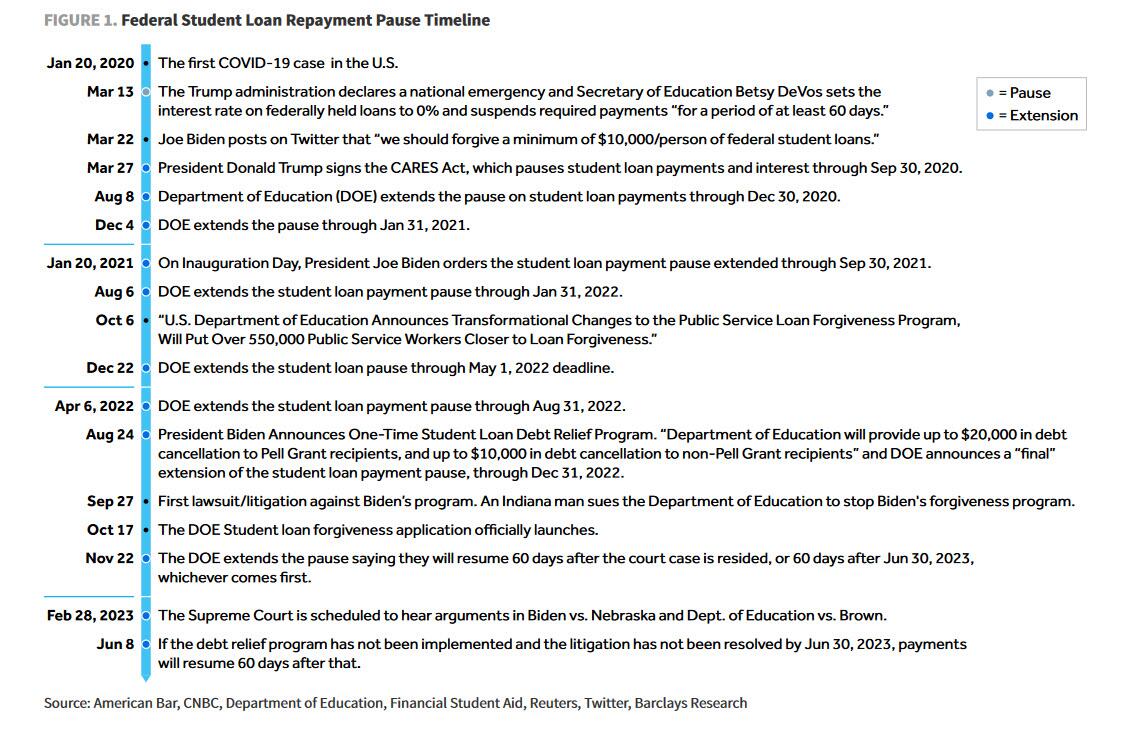
“So what? Some college students with tuition debt now need to pay their loans.”
Whereas, on the floor, the restarting of funds doesn’t sound like a “huge deal,” it’s. As of the top of Q1-2023, nearly $1.8 Trillion in pupil mortgage debt is excellent. That debt carries a considerably greater rate of interest than present financial institution mortgage charges.
“About 92 p.c of pupil mortgage debt is federal, with rates of interest starting from 4.99 p.c to 7.54 p.c. Common non-public pupil mortgage rates of interest, alternatively, can vary from just below 4 p.c to nearly 15 p.c.” – Bankrate
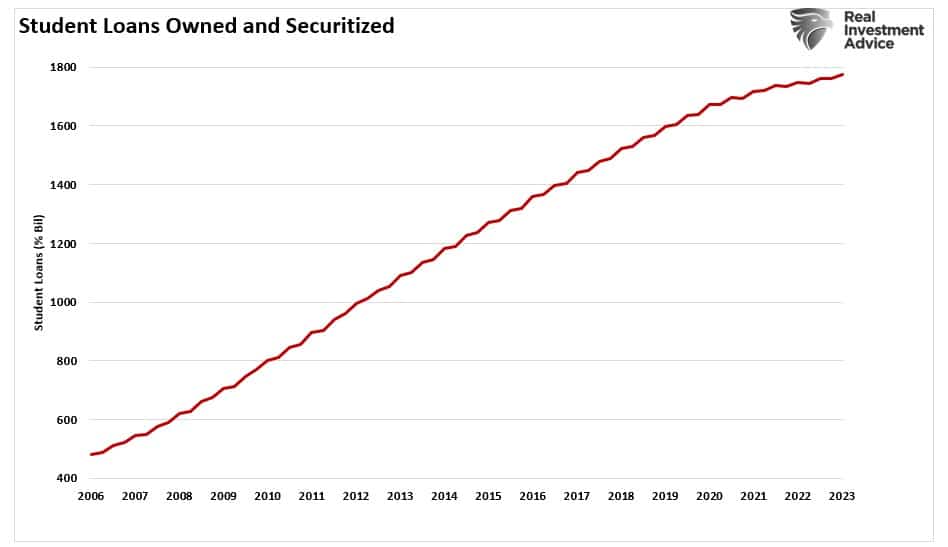
While you account for the scale of the debt excellent, the impression on private spending sooner or later is important.
“The evaluation relies on federal pupil mortgage knowledge for the combination $1.4 trillion stability throughout the 40.5mn debtors by age cohort. Using a 10-year fee interval and a 5.8% rate of interest, the financial institution calculates an approximate $390/month fee throughout cohorts.
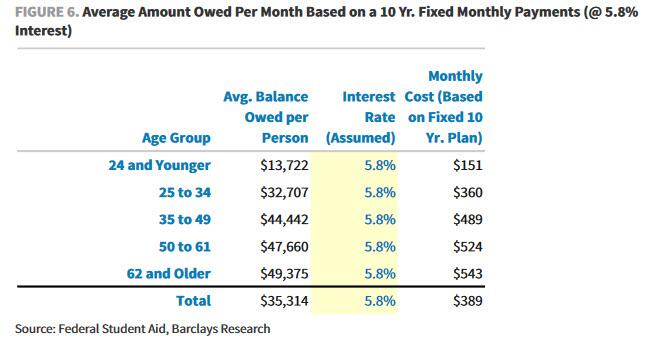
Avg Quantity Owed By Mortgage
“In comparison with a median pre-tax private annual revenue of ~$57k, this fee represents an approximate 8% headwind to month-to-month revenue. In combination, this quantities to an “extra” (or slightly, authentic, because the funds had been there after which three years in the past, they only stopped) $15.8bn in month-to-month fee for federal pupil loans affecting roughly 15.5% of the U.S. grownup inhabitants (and 32% of the 25- to 34-year-old cohort).” – Barclays (LON:)
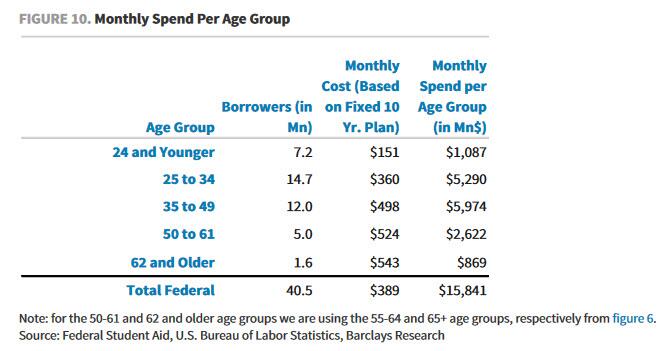
That could be a important amount of cash customers have retained to spend on different issues. Such is probably going why retail spending has remained surprisingly buoyant within the face of upper rates of interest and slowing financial progress. Nevertheless, the query is whether or not the return of tuition funds will weaken that financial help.
Retail Gross sales And Financial Development
In Q1 of 2023, the U.S. financial system totaled $26.5 Trillion. Of that, as proven, Private Consumption Expenditures, what we spend within the financial system, complete $18 Trillion.
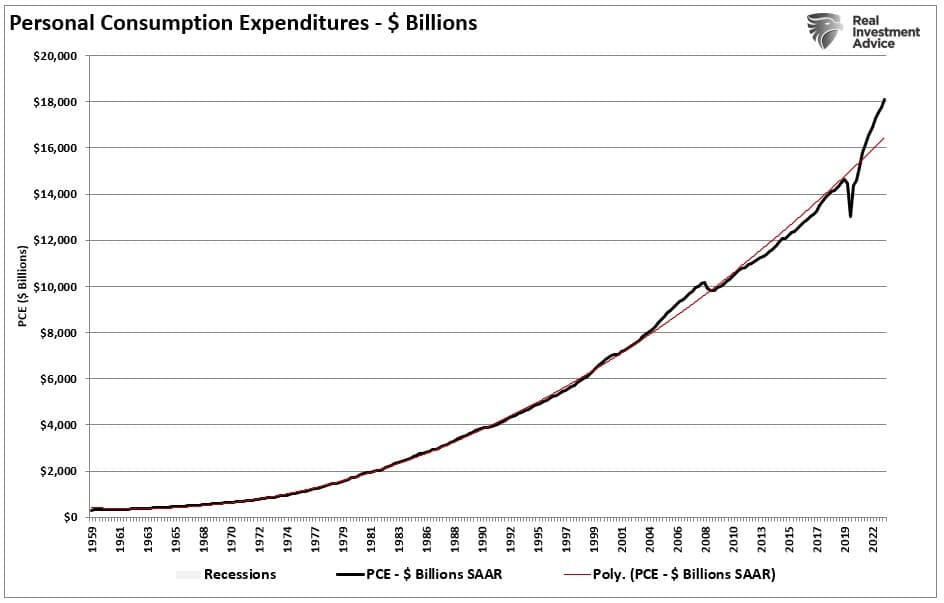
In different phrases, almost 70% of the financial system is a operate of client spending.
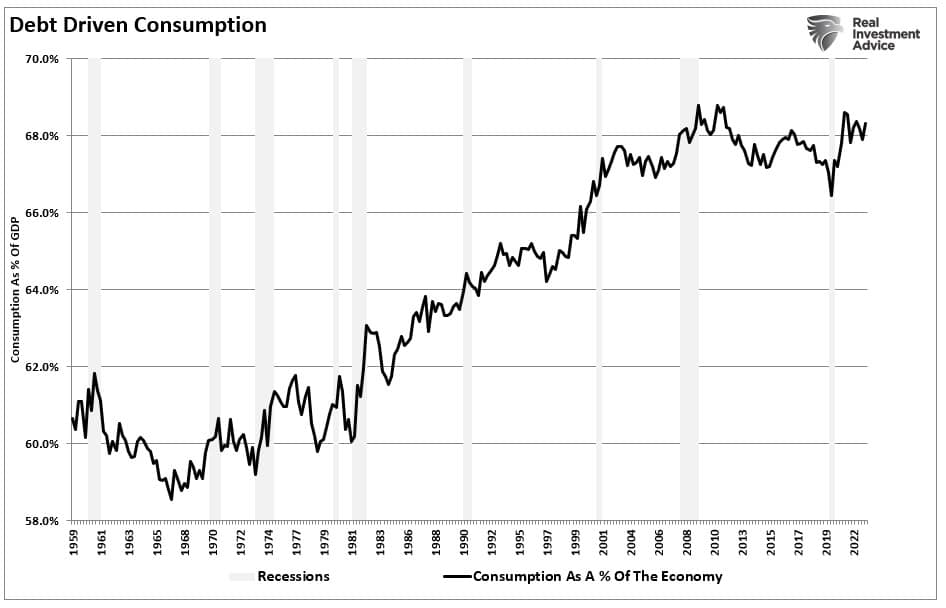
Logically, the priority is that when pupil mortgage funds restart, that may divert spending from the financial system into debt service. (This is identical concern the U.S. faces with $32 Trillion in debt.)
Within the U.S., retail gross sales comprise about 40% of non-public consumption expenditures. When pupil mortgage funds restart, essentially the most fast impression will probably be felt in retail gross sales as customers have much less cash to spend on discretionary gadgets and companies. Since 1992, retail gross sales, on a seasonally adjusted foundation, have grown at a mean fee of $1.4 billion month-to-month. The chart beneath exhibits the annual fee of change in seasonally adjusted retail gross sales versus the 12-month transferring common of the annual fee of change.
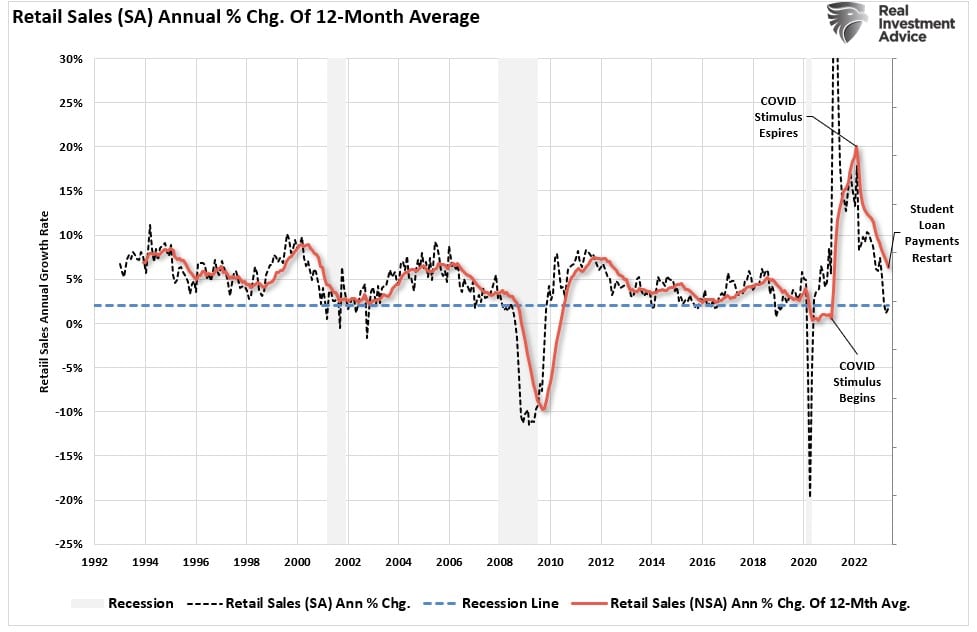
If Barclay’s Financial institution is appropriate in its assumptions, eradicating the scholar mortgage moratorium on funds will considerably impression retail gross sales. The chart beneath tasks the common retail gross sales progress much less the scholar mortgage funds. If Barclay’s is appropriate in its assumptions, the impression on retail gross sales may very well be important.
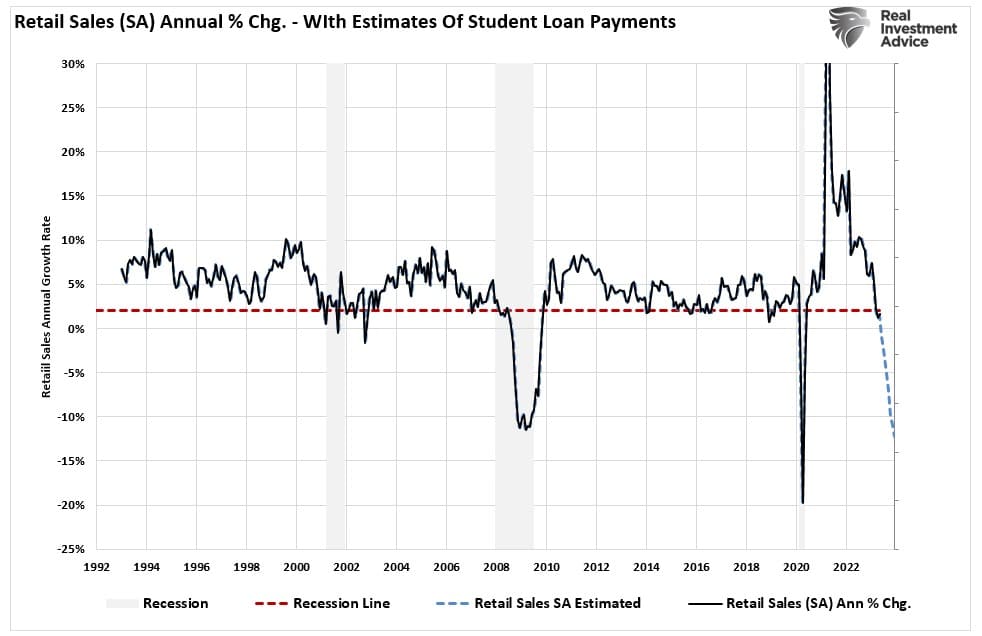
A Recession Danger
Given the significance of retail gross sales on general financial progress, it’s troublesome to keep away from a recession.
“Based on a New York Fed research, the common pupil mortgage fee is $393 month-to-month. For customers benefiting from this system, they’ve deferred 39 months’ price of funds, leading to greater than $15,327 in extra discretionary revenue in the course of the interval, a lot bigger than the quantity most customers obtained from different COVID stimulus packages.
That sudden enhance of $393 per thirty days in mortgage repayments will pressure prime-age customers (these aged 18-44 years) to chop again on discretionary spending. Since parts of that individual demographic are likely to prioritize experiences over items consumption, we’ll doubtless see a extra important impression on companies which, as mentioned beforehand, has been the one help preserving the financial system out of recession.
“This isn’t the primary time now we have seen the manufacturing facet of the financial system contract, however companies remained sturdy sufficient to maintain the general financial system out of recession. The financial system equally prevented a “recession” in 1998, 2011, and 2015.”
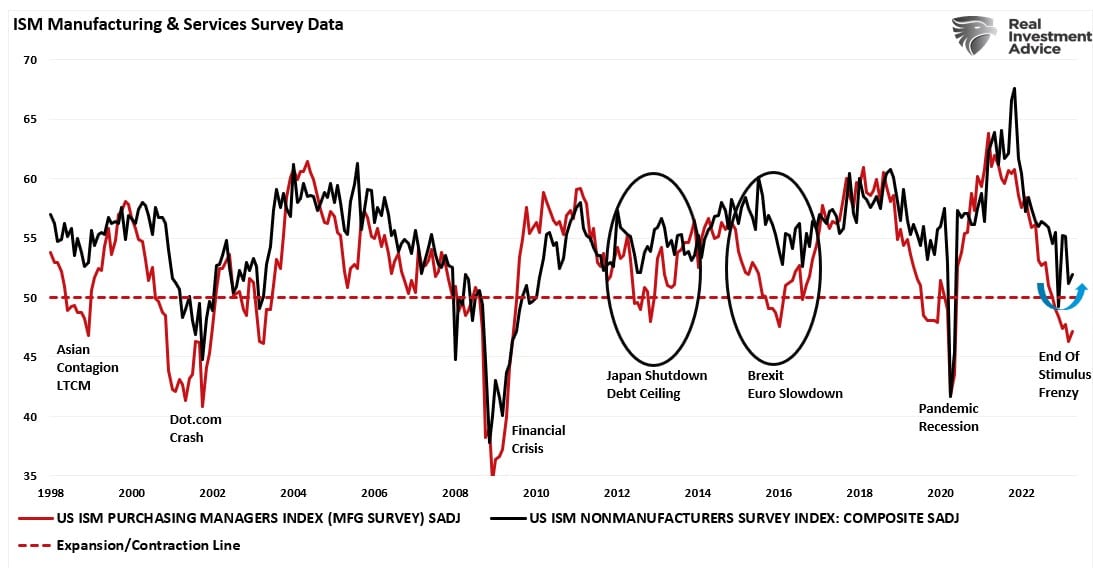
If the information is appropriate, the financial and earnings threat is important.
An Neglected Danger
Since January, buyers have been piling into cyclical shares, assuming inflation would ease and the financial system would keep away from a recession. As famous, Wall Road analysts have turn into optimistic about accelerating earnings progress into subsequent yr.
“Analysts count on the primary quarter of 2023 will mark the underside for the earnings decline, and progress will speed up into year-end. Once more, that is regardless of the Fed fee hikes and tighter financial institution lending requirements that may act to gradual financial progress. The issue with these expectations is the detachment of earnings estimates above the long-term progress development. The one two earlier intervals with comparable deviations are the “Monetary Disaster” and the “Dot.com” bubble.“
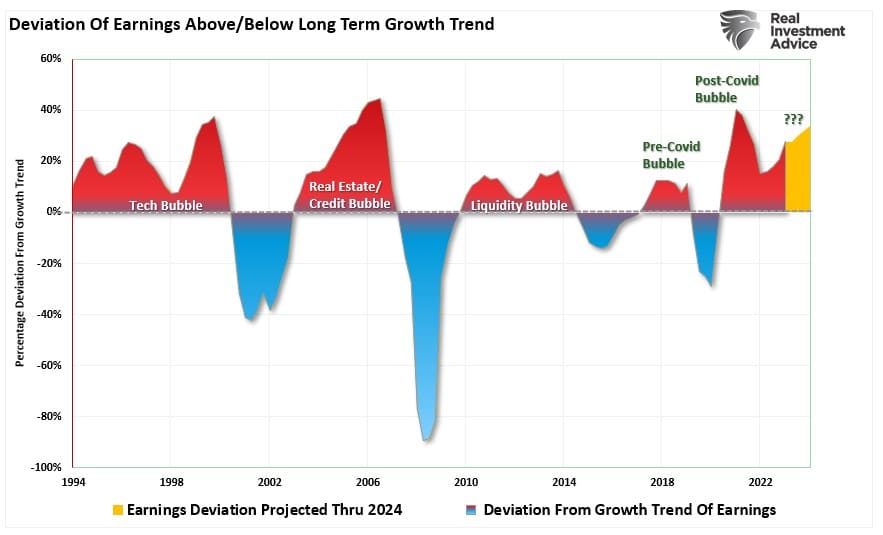
Nevertheless, the restarting of pupil mortgage repayments could be the one factor Wall Road ignored in its rush to trumpet the “return of the bull.” The issue is that cyclical shares closely depend upon client spending, significantly in expertise, the place corporations like Apple (NASDAQ:), Microsoft (NASDAQ:), and Amazon (NASDAQ:) are direct-to-consumer corporations. As these funds are redirected to pupil mortgage funds, a contraction in client spending will immediately impression these corporations’ gross sales, lowering bottom-line earnings.
On condition that markets, and lots of the high-flying names in 2023, are grossly overvalued, any detrimental impression on forward-earnings estimates might result in a big value correction. Most definitely, such a value reversion would accompany a recession within the financial system brought on by a contraction in spending.
Whereas it’s at all times unwise to guess towards the U.S. client, the restarting of pupil mortgage funds is probably going a hurdle the financial system will battle with. Moreover, it’s doubtless that is an impression the market has but to issue into its assumptions for future financial and earnings progress charges.
We’ll discover out later this yr.
[ad_2]
Source link




